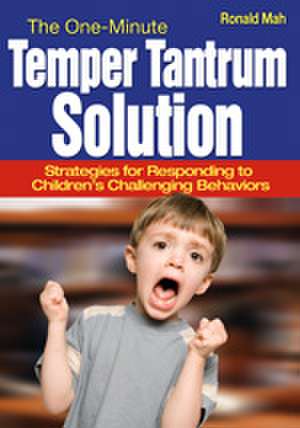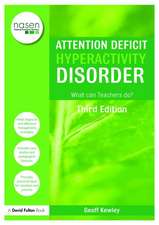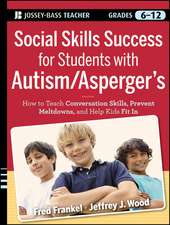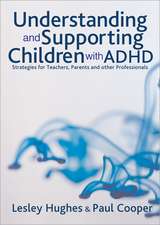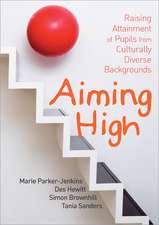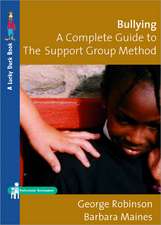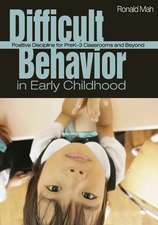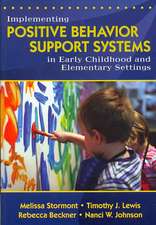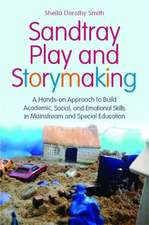The One-Minute Temper Tantrum Solution: Strategies for Responding to Children's Challenging Behaviors
Autor Ronald Mahen Limba Engleză Paperback – 5 aug 2008
Preț: 199.46 lei
Nou
Puncte Express: 299
Preț estimativ în valută:
38.17€ • 39.62$ • 31.83£
38.17€ • 39.62$ • 31.83£
Carte tipărită la comandă
Livrare economică 22 martie-05 aprilie
Preluare comenzi: 021 569.72.76
Specificații
ISBN-13: 9781412957212
ISBN-10: 1412957214
Pagini: 160
Dimensiuni: 178 x 254 x 13 mm
Greutate: 0.34 kg
Ediția:1
Editura: SAGE Publications
Colecția Corwin
Locul publicării:Thousand Oaks, United States
ISBN-10: 1412957214
Pagini: 160
Dimensiuni: 178 x 254 x 13 mm
Greutate: 0.34 kg
Ediția:1
Editura: SAGE Publications
Colecția Corwin
Locul publicării:Thousand Oaks, United States
Recenzii
“Entertaining and informative, this book looks at the motivation behind temper tantrums and presents the information in an easy-to-read format for teachers.”
"Mah’s new book is fantastic! It simplifies the different types of temper tantrums into a manageable approach for educators and child care professionals."
“I’m impressed with the information presented in this book, which delves into child and adult development and provides educators with an understanding of where tantrums come from.”
"Mah’s new book is fantastic! It simplifies the different types of temper tantrums into a manageable approach for educators and child care professionals."
“I’m impressed with the information presented in this book, which delves into child and adult development and provides educators with an understanding of where tantrums come from.”
Cuprins
Acknowledgments
About the Author
Introduction
1. Orderly Assessment to Successful Intervention: Where Do You Start? Where Do You End Up?
2. Developmental Factors: Developmental Energy Will Reassert
3. Situational, Physical, and Disruption Factors: 2 + 1 = Trouble!
4. Temperamental Factors: They Were Born That Way!
5. Systemic Factors: The Savior
6. Specific or Specialized Factors and Moral Factors: Try Harder
7. Four Types of Temper Tantrums! Not Always About Power and Control
8. Manipulative Tantrums: Power and Control
9. Upset Temper Tantrums: Distress
10. Helpless Temper Tantrums: Not Distress but Despair
11. Stress and the Cathartic Tantrum: Releasing the Cathartic Tantrums
12. Getting It Wrong and Getting It Right
Conclusion
References
Index
About the Author
Introduction
1. Orderly Assessment to Successful Intervention: Where Do You Start? Where Do You End Up?
2. Developmental Factors: Developmental Energy Will Reassert
3. Situational, Physical, and Disruption Factors: 2 + 1 = Trouble!
4. Temperamental Factors: They Were Born That Way!
5. Systemic Factors: The Savior
6. Specific or Specialized Factors and Moral Factors: Try Harder
7. Four Types of Temper Tantrums! Not Always About Power and Control
8. Manipulative Tantrums: Power and Control
9. Upset Temper Tantrums: Distress
10. Helpless Temper Tantrums: Not Distress but Despair
11. Stress and the Cathartic Tantrum: Releasing the Cathartic Tantrums
12. Getting It Wrong and Getting It Right
Conclusion
References
Index
Notă biografică
Ronald Mah, an educator and licensed marriage and family therapist, has worked in early childhood education for 16 years. A credentialed elementary and secondary teacher, he is the author of Difficult Behavior in Early Childhood and The One-Minute Temper Tantrum Solution (2006 and 2008, Corwin Press). He wrote the Asian Pacific Islander Parent Education Support curriculum (DHS-San Francisco, 1996). Mah has DVDs on child development and behavior (Fixed Earth Films), and has been involved in community and high school mental health clinics, severe emotional disturbance, at-risk youth, welfare-to-work, and Head Start programs. A graduate college instructor and Board of Directors member of the California Association of Marriage and Family Therapists and of the California Kindergarten Association, Mah combines concepts, principles, and philosophy with practical techniques and guidelines for effective and productive results. Mah has a psychotherapy practice in San Leandro, California where he works with children, teens, adults, couples, and families.
Descriere
This resource examines developmental, situational, physical, and temperamental factors that can trigger tantrums and provides effective interventions to help teachers avoid long-term negative consequences for children.
